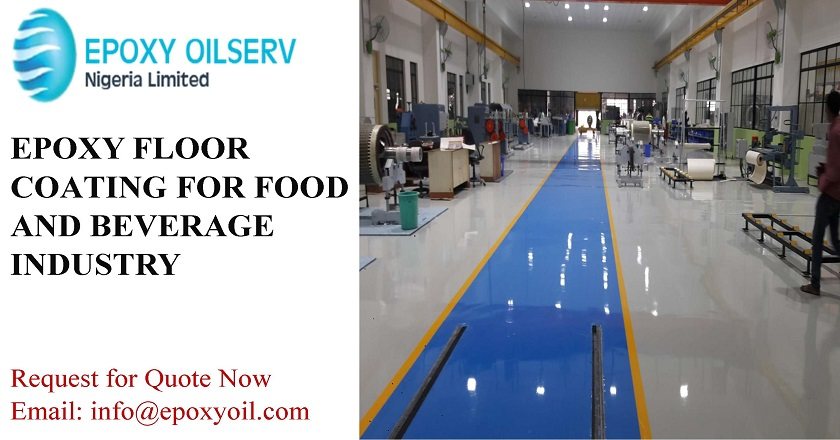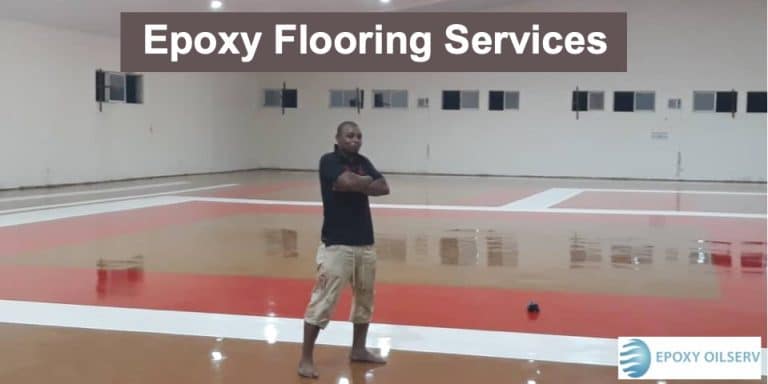Epoxy Floor Coating for Food and Beverage Industry

The floor of a food and beverage industry is typically exposed to all sorts of food byproducts, including fats, hot oils, blood, sugar solutions, and natural food acids. Some of these substances can cause serious damage to concrete because of their corrosive nature. In addition, these contaminants can infiltrate uncoated concrete, resulting in uncontrolled growth of bacteria, ultimately degrading the processed food’s purity.
Consequently, coatings selected for application to food and beverage processing facility floors must be durable enough and thick enough to create a protective barrier that prevents contaminants from permeating the concrete substrate and ensures a hygienic surface.
Traffic The volume and type of traffic is another important criterion in selecting a floor coating for a food processing facility. Personnel safety and potential liability issues compel food processing plant managers to ensure skid-resistant floors by using textured or grit surfaces. The degree of texture is typically determined by the conditions of operation, frequency of cleaning and maintenance, and presence of oils, greases and other potentially slippery substances.
A high-medium grade of texture for food processing makes sense since these environments are often “wet” either from cleaning agents or from the inherent exposure to oils and grease. Where high impact and heavy loads are part of the traffic pattern, a flexible membrane may be applied beneath the floor coating.
Cleaning Floors in food facilities must be thoroughly cleaned regularly, often several times daily, to keep the food processing operation pure and up to government standards. Consequently, food processing facility floor coatings must be durable enough to handle vigorous cleaning procedures, which typically include very hot water, steam, and aggressive cleaning chemicals. It is clear that only high-performance floor coatings will withstand this kind of punishing maintenance.
On a typical day in a food processing facility, floors are exposed to a variety of process chemicals as well as corrosive cleaning chemicals, primarily detergents. If a floor is subjected to only minor chemical contact, a thin film coating may suffice; however, if a floor is exposed to the variety of moisture, temperature, and chemical conditions typically found in a food processing area, it is essential that the plant manager select a thicker, more durable floor coating that can offer sufficient protection to meet those conditions.
In addition to the corrosive nature of the cleaning chemicals, the very hot, high-pressure steam used in daily cleanings can take its toll on a food processing facility floor. The pressure alone is often capable of removing a standard coating, much like what happens when a deteriorating concrete driveway is pressure-washed. Because the cleaning process is performed repeatedly and at very high temperatures, it is crucial that the coating be thick and durable.
Application Conditions
Yet another factor in selecting epoxy flooring for food and beverage industry involves application conditions. While these issues are typically not relevant for installation of floors and coatings in new facilities, they are indeed relevant when updating an existing facility.
One way to prevent messes and protect the floor of a food grade industry is by installing a certain type of floor coating. Many food processing industries rely on epoxy floor coating to improve the sanitary standards of their building, and ultimately, their product.
There is a good reason why epoxy floor coating is used so frequently in the food industry. For one thing, it provides protection against acids and alkalis. This type of flooring has excellent adhesion and can easily tolerate abrasive cleaning procedures and chemicals, which is a significant factor in producing a clean, spotless working environment. A floor coating that can tolerate the harshness of certain chemical cleaners is essential. Moreover, epoxy floor coating creates a safe working environment with its use of anti-slip adhesives, allowing for quick production and lack of physical safety issues.
Food and beverage industries require durable floors. The better the durability of a floor, the higher the chances are of sanitary conditions. A hygienic surface is vital in establishing a safe, efficient, and government-approved food processing plant.
We are a leading distributor of high quality range of epoxy paints, and epoxy floor coatings designed for food and beverage industry. With support of our excellent team workers, we have been delivering the best quality range of epoxy floor coating for food and beverage industry in Nigeria. If you decide that epoxy floor coating is indeed the right way to go, then request a quote from our epoxy floor coating experts today!
If you’d like to learn more about durable epoxy floor coatings, visit Epoxy Oilserv Limited, we organize monthly Epoxy Floor training in Nigeria, and we are ever ready to help you find the best solution for your needs!



